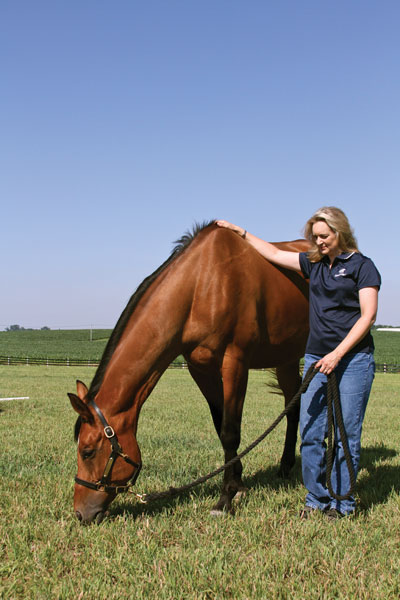Post Colic Surgery Care and Diet
 Dr. Lydia Gray hand-grazing her horse Newman post colic surgery
Dr. Lydia Gray hand-grazing her horse Newman post colic surgery
What would you recommend for grain/hay and/or probiotics for a 15 yr old mare that has tied up before, ulcered and just had colic surgery. Her intestines were impacted with Corn Cob bedding. She is not forming manure yet, still cow patty style, she will be home a week March 3rd. Thanks, Brenda
Dear Brenda,
As someone whose own horse had (successful!) colic surgery, I’m sorry to hear that your mare had to undergo this. It’s very stressful for both the horse and the owner. While I commend you for seeking outside nutritional advice, it’s really important in situations like this to follow the discharging hospital’s instructions as far as diet, turnout, incision care and other management. They have the best working knowledge of your mare’s health status and should be able to design a feeding, exercise and care regimen to promote recovery.
Introducing food to a horse after colic surgery can be a delicate process, more so in your case because your mare has some other conditions (ulcers and tying up) that probably do better with specialized nutrition. In general though, the goals are to restore your horse’s normal intestinal function and promote tissue healing while not triggering an ulcer, an episode of tying up or further digestive problems.
It’s important to get the intestine moving but since food was withheld because of colic and surgery, this has to be done slowly and with high-quality, easily digestible foods. Many surgeons recommend short bouts (10-15 minutes) of hand grazing fresh grass several times a day. This provides your horse with forage of high water content. Small, frequent hay meals are also suggested, and the hay can even be soaked or at least wetted to add water to the bowels and soften this all-important roughage. Other types of forage to consider adding gradually to the diet include hay cubes, hay pellets and hay stretcher. Beet pulp is an excellent source of nutrition—falling somewhere between hays and grains—with fiber that is fermented by the good bugs of your horse’s hindgut, but if your horse isn’t used to it then now may not be the time to introduce a new food. Even if your horse is used to getting some grain in his diet, you may want to wait before starting back up with it. Forage is your horse’s friend right now!
Several supplement ingredients come to mind that may support normal healing of the GI tract, replenish the good bugs, and assist in digestion of starches and fiber, but talk to the veterinary surgeon before adding anything. Specifically, ask if amino acids like glutamine to help repair intestinal cells, probiotics (beneficial bacteria), prebiotics (food for the beneficial bacteria), active live yeast like Saccharomyces cerevisiae, enzymes like amylase, and other ingredients might be useful in your mare’s recovery. Best of luck bringing her back to health!